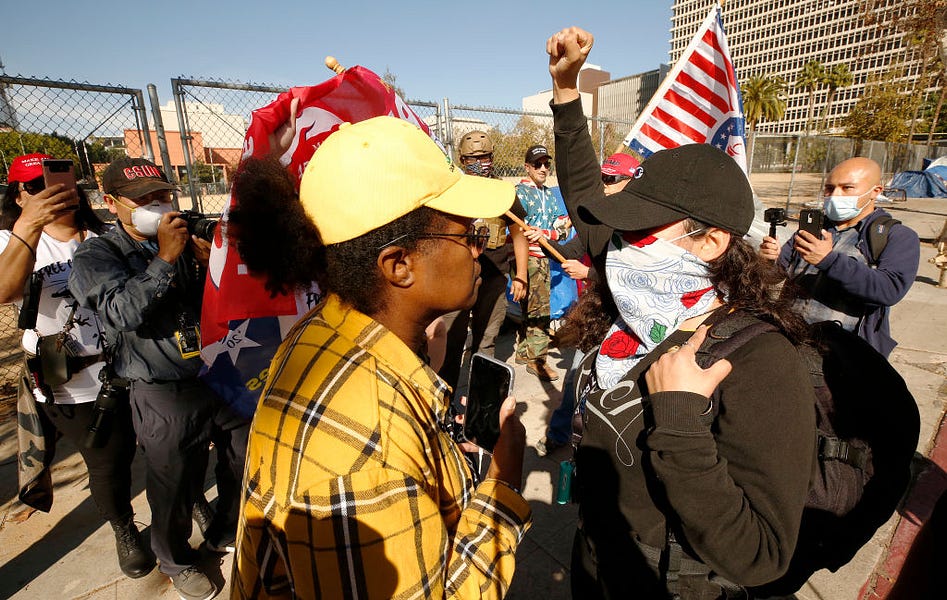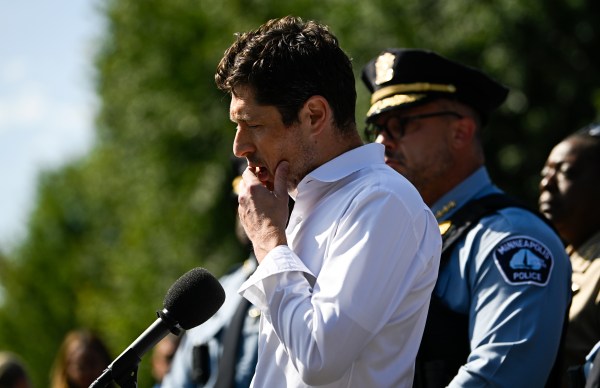In June 2017, James Hodgkinson, a Bernie Sanders supporter, opened fire on Republican congressmen at a softball field in Virginia. The next year, Caesar Sayoc, a Trump supporter, mailed 16 pipe bombs to prominent Democrats and media figures, including former President Barack Obama and Vice President Joe Biden. In 2020, rioters and gangs loosely affiliated with the Antifa movement battled police in Portland, Oregon, and elsewhere. In January 2021, the Proud Boys and Oath Keepers led thousands of pro-Trump protesters in an attempted terrorist attack on the U.S. Congress.
Few people were killed in these incidents—but not for lack of trying. There is, as David French recently wrote, a “whiff of civil war in the air.” According to research from the University of Virginia's Center for Politics, 80 percent of Biden voters, and 84 percent of Trump voters, agree that their political opposition “present[s] a clear and present danger to American democracy.” More than 70 percent on each side want to censor the other side’s media and believe that the other side “no longer believe[s] in the ideas that make America great.”
Most worryingly, an increasing number of Americans openly admit to pollsters their willingness to resort to violence. According to PRRI, 30 percent of Republicans, including almost 40 percent of those who believe the 2020 election was stolen, believe that “things have gotten so far off track [that] true American patriots may have to resort to violence in order to save our country.” Twenty-six percent of white evangelicals agreed with that statement, the highest of any religious group.
Are they right? Is it time to fight?
I spent the last 20 years thinking about justice and war (and finally published the fruit of that reflection earlier this year). A major focus of my research was on the justice or injustice of revolt, civil war, and humanitarian intervention. I was interested in where the threshold is beyond which it is justified, even obligatory, for citizens to take up arms against their government or each other. As a scholar of international affairs, I was initially interested in civil wars elsewhere—but my conclusions apply here at home as well.
So, what’s the answer? The full argument gets very dense and technical and different philosophers offer different answers across the centuries. As Inigo Montoya would say, “Let me explain. No, there is too much. Let me sum up.” Let me sum up the rough consensus:
When the government murders or enslaves large numbers of civilians on purpose, we can fight back. When it embarks on a totalitarian or genocidal path—when it violates “the laws of nature,” as the classical just war tradition puts it—it is no longer acting like a government and we owe it no allegiance. At the other end of the spectrum, when the government stops functioning altogether, we can set up another one—which means we can use force to put down anarchy, warlordism, and criminality when the government cannot or will not do so. That’s the threshold for when revolution, civil war, insurgency, or vigilantism is justified.
And the United States in 2021 isn’t anywhere close. Most of Americans’ complaints about their political opponents amounts to an accusation that the other side is passing, or has passed, bad laws, like Democrats’ fear that Republicans are trying to ban critical race theory in public schools, or Republicans’ fear of Democrats’ support for transgender bathrooms. The just response to unjust law in a democracy is to try to pass better laws, not to start killing people. If political participation is unavailable, as was true for African Americans during Jim Crow, launch a nonviolent resistance campaign to dramatize injustice.
Let’s press the argument even further. What about violations of our liberty? Some Americans, mostly on the right, fear (wrongly) that the government is encroaching on their personal liberty through mask mandates or vaccine mandates. If the Supreme Court overturns Roe vs. Wade this year, as seems possible, the left will argue (wrongly) that the impending wave of anti-abortion legislation in Republican-controlled states would be a violation of personal liberty.
Even more to the point, some Americans’ complaints are not merely that the other side is passing bad laws, but that they are rigging the system, changing the rules, and subverting the norms and spirit of democracy. The left believes that the right is rigging election laws to fix future balloting. The right believes that the left did so in 2020. The left believes the conservative majority on the Supreme Court is illegitimate; the right fears the left is about to embark on court-packing. The right believes the left has used its cultural power to ostracize, demean, and label them as deplorable extremists. The left believes the right, in backing Trump, has openly embraced authoritarianism.
Let’s assume for the moment that every one of these critiques is accurate and not exaggerated nut-picking, conspiracy theorizing, or bad-faith whataboutism. Even then, none of them comes close to justifying political violence. None of those things are the same as “widespread, systematic murder,” “totalitarianism,” or “state collapse and anarchy.” Political violence is not the appropriate response to any of these complaints. Political engagement is.
Just war theory is rooted in Christian political thinking. Christian thought on government begins with the apostle Paul’s insistence, in Romans 13, that the ruler is “God’s servant for your good,” which is why he insisted, “Let every person be subject to the governing authorities. For there is no authority except from God, and those that exist have been instituted by God. Therefore whoever resists the authorities resists what God has appointed, and those who resist will incur judgment.”
Paul wrote those words about the authoritarian Roman imperium that oversaw the execution of Jesus. That leaves extraordinarily little room for us to resist government or fight against it on the grounds that we dislike its laws or believe our personal freedom has been marginally circumscribed. Government can be undemocratic and still fall well short of the genocidal or totalitarian threshold required to justify rebellion. In those cases, they can still rightfully expect our obedience under most circumstances.
There are cases in which rebellion is justified. Enslaved Africans owed no obedience either to their owners nor to the government that allowed their enslavement. Race-based chattel slavery was a form of totalitarian and quasi-genocidal government; slave rebellions were fully justified. Similarly, but to a lesser extent, the British military occupation of Boston in 1768, the massacre of civilians in 1770, and the creation of military government in 1774 seemed a clear signal that the British monarchy intended a form of authoritarian control of the colonies well beyond the norm. And, of course, the United States was justified in defending its territory and system of free government from the Confederacy.
These examples highlight how far we are today from any of those situations. Antifa street violence is bad, but it is nowhere near the level of violence that regularly wracked American cities in the late 1960s; Seattle’s CHAZ is not Fort Sumter. The administrative state is overbearing and disturbingly unaccountable, but it is a far cry from a military occupation of American cities or totalitarian enslavement of the population. Cancel culture on the left and nationalist agitprop on the right are authoritarian in spirit and would subvert the spirit of the Constitution if given free rein—and I agree that opposing both are urgent priorities for saving American democracy, but only through the ballot and the protest, not through the bullet or the bomb.
Daydreaming of civil war is a First World privilege. We indulge in fantasies of winning a final victory against political opponents in a culture war that will, in truth, never end—and we do so because almost none of us have any real experience of physical violence beyond what we see in the movies. The Oath Keepers and Proud Boys and Antifa and January 6 rioters are best understood as Braveheart LARPers, charging the imaginary fields of Bannockburn in their minds, with lower stakes and dumber tactics.
But modern civil war is ugly, vicious, and demeaning, involving an endless tit-for-tat cycle of mutual terrorism, assassinations, rioting, anonymous bombings, and lockdowns that are more likely to create the very scenario of authoritarian martial law that both sides insist they want to prevent. The American experiment in free government is an extraordinarily amazing success—and it is also extraordinarily fragile. We do indeed face threats to our freedom and our way of life. But the “whiff of civil war” is, itself, one of those threats, not the solution to it. Far better to devote our energies to upkeep American democracy from the inside than to give up on it altogether in exchange for deluded fantasies of violence.
Paul D. Miller is a professor of the practice of international affairs at Georgetown University.







Please note that we at The Dispatch hold ourselves, our work, and our commenters to a higher standard than other places on the internet. We welcome comments that foster genuine debate or discussion—including comments critical of us or our work—but responses that include ad hominem attacks on fellow Dispatch members or are intended to stoke fear and anger may be moderated.
With your membership, you only have the ability to comment on The Morning Dispatch articles. Consider upgrading to join the conversation everywhere.